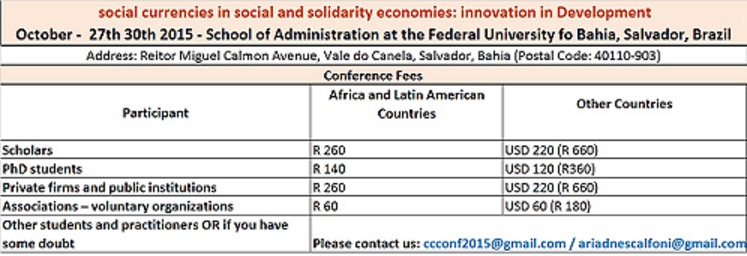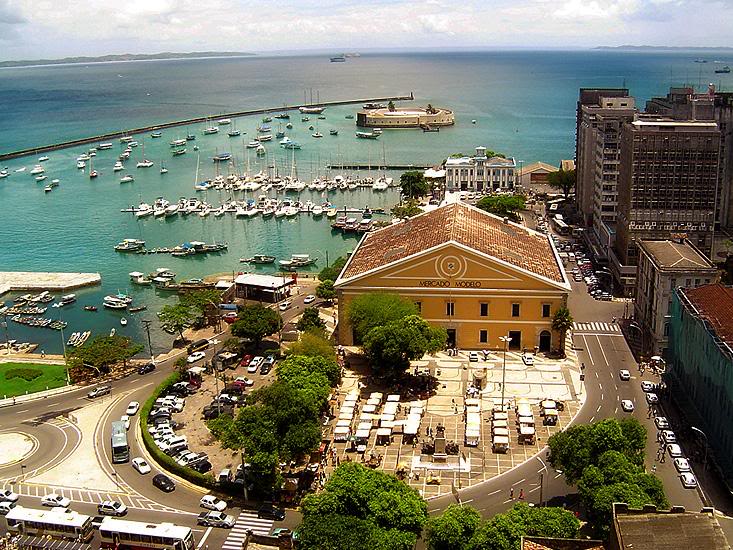
|
|
|
|
Complete papers and experience reports Tuesday - October 27th 14:00-15:30pm Theme 1: Social and complementary currencies for development purposes Complementary currencies and the global economy? Peter Brass (session coordinator) Complementary Currencies and Capital Investments - Rolf Schroeder Financing for development: a monetary issue in which money does not have a word - Tristan Dissaux Theme 2: Impact and results of social and complementary currencies (Room 2) Spice Impact Measurement: Talking the Talk and Walking the Walk - Booth Becky Theme 3: Contextual differences and lessons from experiences (Room 3) Experience Report: Community Currencies in Action EU Project - Leander Bindewald Theme 4: Typologies, models and innovation (Room 4) D-CENT: Freecoin Toolchain Design and application to Pilots - Marco Sachy (session coordinator) Wednesday - October 28th 14:00-15:30pm Theme 1: Social and complementary currencies for development purposes (Room 1) Contestations and contradictions in the Argentine Redes de Trueque - Georgina Gomez and Joop de Wit Theme 2: Impact and results of social and complementary currencies (Room 2) Mutual Aid Networks: Redesigning Work for a Cooperative, Regenerative Economy - Stephanie Rearick Trust and Spending of Community Currencies in Kenya - William Ruddick Theme 4: Typologies, models and innovation (Room 4) 15:30 – 17:00pm Theme 1: Social and complementary currencies for development purposes (Room 1) Theme 3: Contextual differences and lessons from experiences (Room 3) Theme 4: Typologies, models and innovation (Room 4) Thursday - October 29th 14:00-15:30pm Theme 1: Social and complementary currencies for development purposes (Room 1) Theme 2: Impact and results of social and complementary currencies (Room 2) Impact of complementary currency for sustainability: an integral approach - Christophe Place Theme 3: Contextual differences and lessons from experiences (Room 3) Theme 4: Typologies, models and innovation (Room 4) Artists as Bankers, Currency as Art - Lenara Verle
CONFERENCE PROGRAM, FIELD VISIT AND EXCHANGE CLUB (A) Site visit information: VIVETUR is a community based tourism enterprise. It is part of the solidarity economy local network of Matarandiba. This is a community innitiative that promotes a touristic experience for its visitors within the village. We are organizing a field visit in Matarandiba to learn about its experience in social currency and community bank. The field visit will be on Friday, October 30th. We will depart from Salvador early morning (about 8am) to the Island of Itaparica and return to Salvador early evening (abour 6pm). There are 40 slots available. To guarantee your spot, please, send the payment to Magno’s email <magnowmufba@gmail.com> by paypal system. The tour costs 170 Reais (USD 45). The package includes: a) Round trip transportation to Matarandiba (45 min by boat and 55 min by Van) b) Translation into English c) Welcome breakfast d) Visit to the local solidarity economy associations e) 20 Reais worth of Conchas (the local social currency) f) Traditional lunch (based on fish and shellfish) g) A guided walk on the Pontal trail h) A local boat tour i) Cultural presentation (Samba de Roda Voa Voa Maria) j) Afternoon snack If you have a flight before 22:00h on Friday 30th, we suggest you not to attend the field visit. (B) Exchange Club: we are getting excited about meeting all of you at the conference in one week. We are writing to invite you all to participate in the Exchange Club that will operate on Thursday, 29th. How does it work ? a) Participants bring as many item as they want in good condition to exchange. b) Participants will exchange theirs item for a social currency called AXÉ. Each item has a value of one AXÉ. c) On Thursday, 29th we will open the Exchange market for you to trade AXÉ vis a vis item in the market. We hope you interested in participating ! Don't forget your items. It should be great go back to your country with something from new friends for remind them. If you have more questions about the field visit or the exchange club, contact ccconf2015@gmail.com. Registration and payment guidelines The local Organizing Committee decided to mantain the minor fees payment. PLEASE, CONSIDER THE CONFERENCE FEES AS SHOWN IN THE TABLE BELOW. In order to proceed your registration and payment, please: 2) Once having your login and password, click in the link and fill the correspondent form. 3) Choose the payment mode according to the CONFERENCE FEES TABLE available in our website. 4) Proceed your payment by PAYPAL system. Click on DONATE button below. ATTENTION: make sure that you are registered in paypal system. If you are not, access the paypal website (www.paypal.com) and create your account. 5) After we receive the confirmation from the PAYPAL system, we will send to you an email confirming your registration. Please, note that during the PAYPAL process you have to address your payment to Magno's email. Magno is part of our organizing team and he is in charge of the conference financial issues. The Magno's email is: <magnowmufba@gmail.com> We would like to notice you that soon the general program of the conference will be on our website. We look forward for meet you here, in Salvador, Brazil. Conference Fees and Other Information
To determine the number of days and budget that you need during the conference, please refer to the “other costs” table here: Salvador costs 2015 COMPLETE PAPER AND EXPERIENCE REPORT SUBMISSIONS Complete papers and Experience reports must to be uploaded on the conference website by September 30 , 2015, using your login and password as a new submission See the Model submission for complete papers and experience reports Reminding you the call for paper The complete paper should include: Proposal title ; Authors and short biography ; Abstract ; keywords ; Expanded content. The complete paper must be no more than 25 pages with 1.5 spacing, 12 pt font (including references, tables, figures, notes etc). The experience reports can be uploaded as a power point presentation. Formats: scientific articles or experience reports. Proposals and complete papers can be presented in two formats: scientific article (which is common in scientific conferences) or experience reports. Experience reports open up space to share knowledge gained from the real life experiences of social actors (individuals, social organizations, governments, social movements etc). The focus of experience reports is not theoretical but rather context (social, cultural, economic, environmental, political etc). Reports can focus on procedures, field methodology, results, impacts, challenges, difficulties or others practical aspects. See again the call for papers Call for paper_English ; chamada de trabalhos - Portugues ; Llamada de trabajos - Espanôl
Salvador picture - Mercado Modelo
Organizing Committee Ariádne Scalfoni Rigo (Federal University of Bahia - Brazil) Genauto Carvalho de França Filho (Federal University of Bahia - Brazil) João Joaquim de Melo Neto (Instituto Palmas - Brazil) Juliana Braz (University of São Paulo - Brazil) Georgina M. Gómez (Erasmus University Rotterdam - Netherlands) Jérôme Blanc (Université Lumière Lyon 2 - France) Carlos de Freitas (FMDV - Global Fund for Cities Development) Incubator Solidarity Economy and Territorial Development Management at the School of Administration (ITES - EAUFBA) Team (http://ites.colivre.net/Site) Submission Details 1) Proposals should be submitted in English, Portuguese or Spanish through the website by May 4th , 2015 2) Complete papers will be uploaded on the conference website by September 21st 2015 3) The abstract and the complete paper must be attached as a Word document. The abstract should be between 2-4 pages. The complete paper must be no more than 25 pages. 4) The abstract should be submitted with the file Model Submission (Abstract) 4.1 Proposal identification i. Proposal title ii. Proposal theme (see themes suggested by Organizing Committee) iii. Proposal format (scientific article or experience report) iv. Information on each author: full name; full title; affiliated institutions; country; email address. 4.2 Proposal content v. Main purpose of the paper (research question, main goals, etc) vi. Theoretical framework (except for experience report) vii. Research methodology (for empirical papers only) viii. Results, implications and/or discussions ix. References
5) The complete paper should include
i. Proposal title ii. Abstract (approximately 300 words) iii. Three keywords
Formats: scientific articles or experience reports. Proposals and complete papers can be presented in two formats: scientific article (which is common in scientific conferences) or experience reports. Experience reports open up space to share knowledge gained from the real life experiences of social actors (individuals, social organizations, governments, social movements etc). The focus of experience reports is not theoretical but rather context (social, cultural, economic, environmental, political etc). Reports can focus on procedures, field methodology, results, impacts, challenges, difficulties or others practical aspects. Themes suggested by Organizing CommitteeThe Organizing Committee suggests some general themes for papers, however proposals do not need to be limited to these suggestions. Proposals do need to have discussions relevant to social and complementary currencies. The committee suggests the following: 1) Social and complementary currencies for development purposes such as: local development and sustainability; local production, responsible consumption and social cohesion; articulation and plurality of socio-economic actors (global, regional or local networks); social and solidarity economy dynamics (the plurality of economic forms; the potential management of common goods and collective resources, etc)
2) Impact and results of social and complementary currencies such as: experiences and methodology of impact evaluation; qualitative and quantitative results; evaluation indicators etc.
3) Contextual differences and lessons from experiences such as: learning from experiences and designs (structures) of social and complementary currencies; legitimacy and legal recognition of community currencies; complementary currencies and global crisis; monetary contestations; challenges and critical aspects etc.
4) Typologies, models and innovation such as: proposal theoretical models and typologies to complementary and social currencies; detailing designs and operating rules; complementary and social currencies and social innovation, social technology etc. Call for Papers If you lost the deadline to send abstracts and would like to do it, send us an email: ccconf2015@gmail.com See the Complete Call for Paper in Portuguese See the Complete Call for Paper in Spanish
|
| Online user: 1 | RSS Feed |

|


